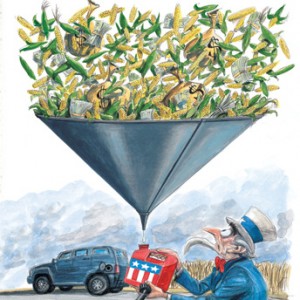Indeed, mitigating greenhouse gas emissions from the energy, agricultural and transportation sectors will require investment of time and money on developing technologies. But while solar, wind, and other renewable energy sources have struggled to gain significant financial and federal support, corn-based ethanol has dominated the game. Consider this: of all 2007 federal subsidies allotted for renewable energies two-thirds were granted to corn-based ethanol companies. This accounted for $3 billion in renewable energy tax credits, over four times the mere $690 million in credits for the remaining companies working to expand and develop all other forms of renewable energy. Needless to say, the federal government has practically put all of their eggs in one basket with regards to renewable energy sources. One should consider why as well as assess just how effective ethanol may be.

2007 Renewable Energy Tax Credits by Technology
Ethanol, one of the most common biofuels, is produced by fermenting and distilling sugary or starchy materials such as corn or sugarcane. While producing ethanol by sugarcane is more efficient, corn production of ethanol is the standard in the United States as we produce upwards to 40% of the world’s corn. For some, corn-based ethanol production is considered to be an efficient process as its energy yield is greater than the energy required to produce it. However, many people believe these calculations do not properly account for the whole picture. For example, in order to use ethanol as a fuel it must be free of water and it cannot be pumped through conventional pipelines. As a result, the common practice of transporting ethanol is by tanker trucks or rail tank cars. Additionally, the energy costs of the amount of fuel used to produce the fertilizers and corn seeds as well as wastewater disposal are often neglected. By calculating in these energy factors, ethanol production is upwards to six times greater than what the end product provides your car engine in terms of power. Clearly, the ethanol and corn industry have had some effective lobbying efforts and Midwest politicians have remained loyal to their home states and constituents.

Source: Rolling Stone
But energy efficiency is only one of the many concerns of corn-based ethanol use (Please take a minute or two to view the posted video). There are also major ethical questions that arise when considering the prospect of trading food for energy when many people are starving and/or face malnutrition (especially in developing countries). Additionally, the IMF estimates that 60% of the recent increase in world food prices can be related to biofuel subsidies in the United States and Europe.
While researchers are currently seeking more efficient alternatives for ethanol production (such as cellulosic ethanol which is derived from switchgrass) the corn-industries stake and influence in this debate still scares me. It seems as if the farmers and large agribusiness companies like Archers Daniels Midland are the only ones benefiting from corn-based ethanol production. This needs to change. Our taxpaying dollars need to be used more efficiently. The stranglehold that ethanol has on federal subsidies for renewable energies must be lifted.
Tags: biofuels, climate change, developing countries, ethanol